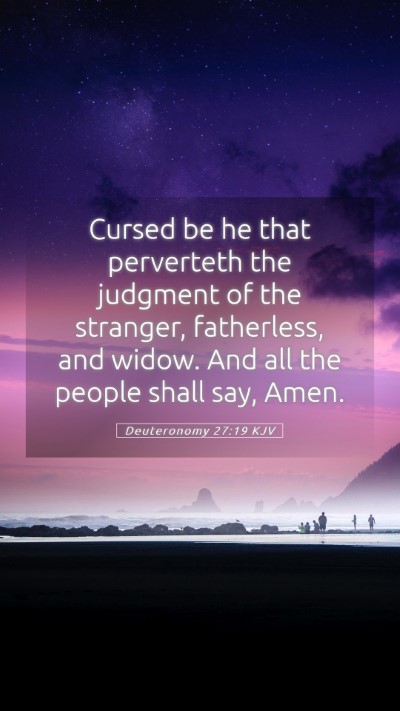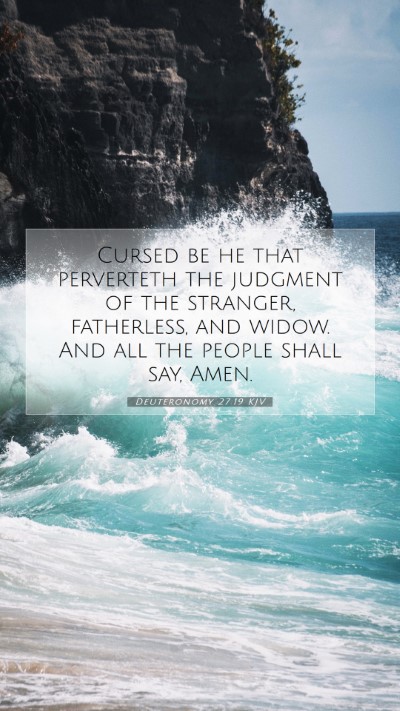Understanding Deuteronomy 27:19
Bible Verse: Deuteronomy 27:19 - "Cursed be he that perverteth the judgment of the stranger, fatherless, and widow. And all the people shall say, Amen."
Overall Meaning and Context
This verse is part of a series of blessings and curses that the Israelites were to recite as they entered into the Promised Land. It emphasizes the importance of justice and righteousness, especially towards the vulnerable members of society, such as strangers, orphans, and widows. The collective "Amen" signifies the people's agreement with the covenant stipulated by God.
Commentary Insights
-
Matthew Henry:
Henry emphasizes that this curse reveals God's concern for social justice. It warns against corrupting justice for those unable to defend themselves. By proclaiming "Amen," the people affirm their commitment to uphold justice within their community.
-
Albert Barnes:
-
Adam Clarke:
Clarke elaborates on the idea that the act of cursing those who misjudge the less fortunate is not merely punitive but instructive. It serves as a strong societal reminder to uphold justice. The inclusion of "fatherless" and "widow" underscores the need for compassion among the rich and powerful.
Key Themes
- Social Justice: The verse stresses the need for equitable treatment of all citizens, particularly those who are weak or marginalized.
- Covenant Responsibility: The importance of community members holding each other accountable to God's standards of morality.
- Collective Affirmation: The "Amen" signifies a shared responsibleness among the Israelites to heed God's law.
Historical Context
This verse forms part of Mosaic Law, which was intended to guide the Israelites in their new life in Canaan. Historical interpretations often cite that laws like this were critical in establishing a fair and just society, illustrating the values that were crucial for the proper functioning of a community.
Application to Daily Life
In contemporary society, this verse can be a guiding principle for advocating fairness and justice for marginalized groups. Believers are called to reflect God's character by showing compassion and ensuring that no one is treated unjustly.
Cross References
- Exodus 22:22-24 - "Ye shall not afflict any widow, or fatherless child."
- James 1:27 - "Pure religion and undefiled before God and the Father is this, To visit the fatherless and widows in their affliction."
- Proverbs 31:8-9 - "Open thy mouth for the dumb, in the cause of all such as are appointed to destruction."
Conclusion
Deuteronomy 27:19 reminds us of the crucial role that justice must play in our lives as followers of God. It calls on us to protect the vulnerable and ensure that our communities reflect God's righteousness. In seeking an understanding of Scripture, we must consider both the spiritual and practical implications of such teachings as we study biblical texts.


